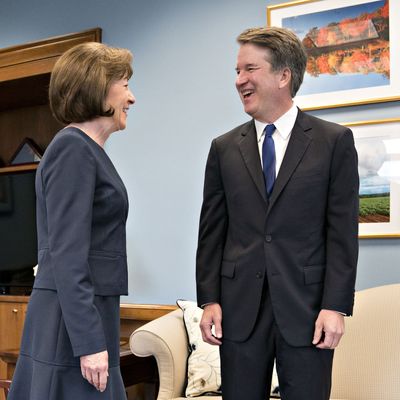
The Senate today took the penultimate step towards confirming Brett Kavanaugh as a Supreme Court Justice by ending debate on a near-party-line 51/49 vote, setting the table for a final vote, which may be held as soon as Saturday.
Of the three Republican senators thought to be on the fence going into this dramatic day, Susan Collins and Jeff Flake voted “aye” while Lisa Murkowski voted “no.” Democrat Joe Manchin voted for cloture, which meant that Vice President Pence did not have to be brought in to break a tie. It also means that in the unlikely event one of the “yea” votes on cloture turns into a “nay” on confirmation, the Kavanaugh cause has one vote to spare.
In the vote on Gorsuch last year, the cloture and final confirmation votes lined up perfectly (with the exception of one Republican senator who missed the final vote for health reasons). That is typically the case in the Senate these days. But Susan Collins’ staff is insisting her vote on the final motion is still undecided.
But even if Collins flips, it won’t matter unless she finds someone to flip with her.
There does remain some suspense about the timing of the final vote. Mitch McConnell originally scheduled it for Saturday afternoon, but Republican Steve Daines has indicated he will attend his daughter’s wedding tomorrow in Montana no matter what the Senate is doing. If the cloture votes hold, Republicans may go ahead and vote in Daines’ absence and confirm Kavanaugh on a 50-49 vote. Otherwise they could wait until Sunday morning or even Monday.
That this long, bitter saga ended on such a close vote with any suspense at all is a testament to the anti-Kavanaugh sentiment that kept all but one of the Democrats up for reelection this year in opposition to him–and to the ruthlessness of Republicans in rushing to a vote the minute a cursory FBI investigation of allegations against Kavanaugh was completed. You can’t find corroborating evidence you don’t look for.
In retrospect the confirmation of Brett Kavanaugh may turn out to be a great turning point in U.S. constitutional law as he consummates a hard-core conservative majority likely to break cherished precedents and set a new path on issues ranging from reproductive rights to health care and the environment. But it also dramatizes the partisan and ideological gulf that will again be measured in the upcoming midterm elections.






























